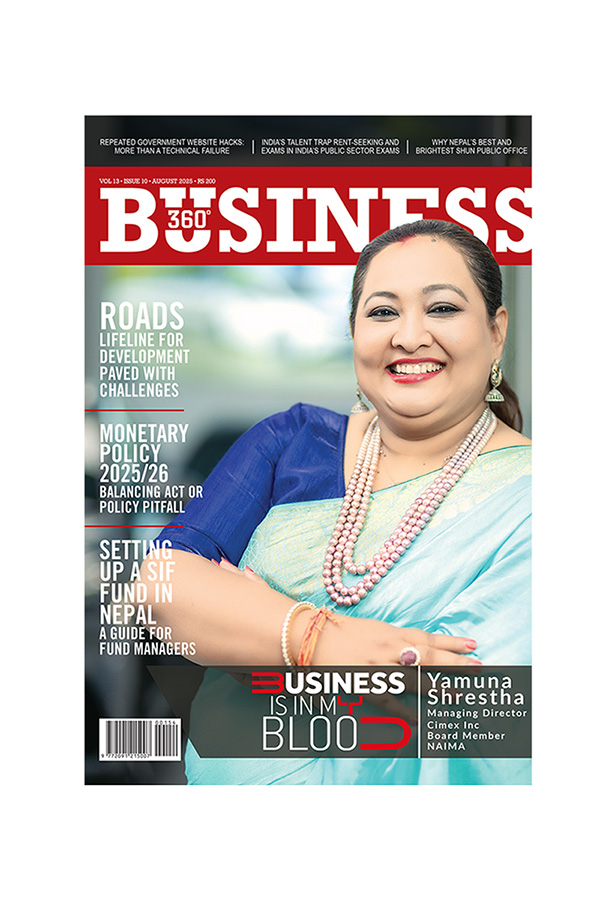
Yulia Koirala is the Founder and Director of Sushila Arts Academy. She studied at an intensive music school learning everything from music to theory to classics during her childhood and later graduated with honours earning many well-merited national awards for her piano playing skills. Later, she shifted gear from music to business management and completed her MBA from Moscow University.
The idea of opening SAA came to her when she took her year old daughter to a big children’s theatre production in Russia. “My daughter loved it so much that she climbed on the stage, was enjoying the decorations, and didn’t want to come off the stage,” she recalls. Koirala came back to Nepal and explored what Kathmandu has to offer for kids in terms of music, art, dance and theatre activities, but was disheartened to find very few and limited options.
She muses, “I considered it a calling… to do something about it, to have taken the initiative and opened a school for such activities.” SAA started out very small and Koirala wasn’t sure how things would work out. But, she dedicated her heart and soul into developing SAA and it grew into an arts academy.
SAA currently runs four different faculties under its umbrella: music, dance, art, and theatre. It has a ballet school with a certified program and specified curriculum. The academy also holds regular exams and provides 90 scholarships annually to talented, committed, underprivileged or financially limited Nepali children. Through SAA, Koirala wants to uplift arts in Nepal to a higher standard as well as improve and create international standards of shows.
Dibesh Dangol of B360 interviewed Yulia Koirala to gain insight into her experience as a leader and her thoughts on leadership. Excerpts:
What do you think are the three basic traits that a leader should possess? What is your definition of leadership?
Vision, persistence and passion. Obstacles come all the time but a leader shouldn’t give up; rather have the strength to lead people. It’s not about calculating outcome and expected results, it’s something beyond that. When leaders have that and share it with the people they work with, normally the employees or team members follow the leader.
Leadership is a passionate path which involves leaders moving past challenges and inspiring people around them. It is mainly about the vision that a leader provides to the team.
What motivates you in your work?
I love what I am doing and don’t consider this as work. I enjoy all the elements like concerts, shows and art exhibitions. I take pleasure in the creative part, touching people’s hearts and souls and making them feel alive. I think all forms of arts make us alive and human especially in today’s world dominated by technology which pushes people towards the virtual world.
What are the challenges you have faced in leadership roles?
There have been many challenges. I felt the first five years of SAA was challenging and there was no smooth path at all. Making people understand the whole concept of arts and its importance was something I had to deal with. Development and growth only happen when there is consistency and mutual understanding. Training my own staff and training teachers about discipline and commitment was another challenge. Nepal doesn’t have an institution where music teachers could learn to become teachers. As a teacher, you need to have so many other qualities rather than just speciality of the subject. While dealing with kids, teachers need to understand psychology. Bina Gurung, a known Montessori educator in Nepal, has been helping me to train my teachers in terms of Montessori education like dealing and connecting with kids, different behaviour patterns and ways to approach them. There are many subtleties that you have to learn and understand. This is still one of the biggest challenges and we need to constantly work on it to elevate our level.
Also, nowadays everyone wants to become known and have celebrity status. If people pursue that, then I think people are in the wrong path. People need to understand that they have to find what they love and devote their mind, soul and body to that first so that they can develop themselves with a professional approach, commitment and hard work. If people focus on this, then whatever they have desired will automatically come to them. So, lots of time and work goes into training youth and making them realise the areas they first need to focus on.
How do you delegate responsibilities?
Most of the teachers have been with me since the establishment of SAA and very few have left us. I believe in building a relationship with my teachers. We operate strongly as a family and team rather than by a hierarchical approach. Once I trust a teacher, I try and support the teacher with exposure, experience, training. We do have some international workshops through cooperation with the Russian Centre of Science and Culture and Indian Cultural Centre. We try and utilise workshop elements to grow on those things. I do send some of my teachers for courses and further training. Once I have a teacher, I trust that teacher. I do observe them closely in terms of delivery and development, but my teachers have all of my faith, trust and respect.
As for management, I have three members in the core management level.
What would you consider your most significant accomplishment?
I am a person who is never happy with anything. I am very critical of myself and my work. I do hear compliments, appreciation and criticism, all of which I am grateful for, but I really don’t dwell on these things. I am quite demanding to myself. I think we have touched the lives of hundreds of kids and youths in a positive way and I consider this to my biggest achievement. One of such many youths is Lucky Darlami who has been my scholar for the last six years and is currently enrolled in a very reputed ballet school -Bangkok City Ballet - in Thailand. Touching youths, making and transforming their lives is what I am proud of.
I think success is measured by people’s appreciation, love and respect. Respect and appreciation cannot be bought. I feel success is when people know you or have heard of you, appreciate your work, see the difference you have made in their lives and expresses gratitude. Success is directly proportional to the number of lives you have touched and made better.
Have you been involved in developing innovative solutions or ideas in your sector?
Yes. I think SAA is the first academy with theatre, dance, music and arts all under one umbrella. We came up with musical Broadway shows and big-budget shows in which we included dance, music and theatre together. Many people have appreciated that ability to raise the level of shows. I think SAA is the only academy which provides so many scholarships as well. That is also something which we started since SAA’s establishment. I have many programmes focused on promoting the scholars’ talent and giving them the platform.
How do you assess the Arts in Nepal?
It’s changing and growing positively. There is a huge difference in this sector when compared to a decade ago and now. I would like to express gratitude to all the sponsors who have come my way and helped me deliver. But, artists are still facing many challenges in Nepal in terms of funding and support from the government. Forms of arts aren’t commercial. Normally in any developed country, arts are either funded by the government or rich people who understand its importance. Funding scholarship is a big lack here.
In terms of arts education, the government has to start thinking about creating institutions and focus on teacher training. In Europe, even if you go to simple schools, teachers are not allowed to teach unless the teacher has graduated from a proper institute. So, Nepal needs to move towards that direction. Though we have some international affiliated programmes, this sector hasn’t been fully institutionalised or considered to be a major economy and culture developer.


-(1)-1752214965.jpg)
-1744698999.jpg)
